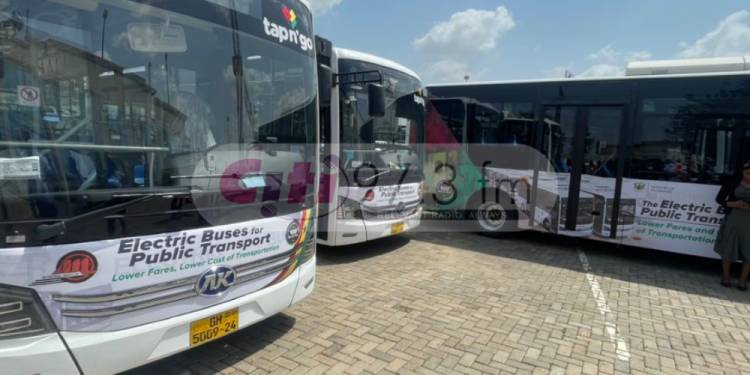Deputy Transport Minister Hassan Tampuli has clarified the intent behind Ghana's recent launch of electric buses, asserting that the initiative is a strategic move to address urban transportation challenges, not a political gimmick tied to the upcoming elections. Speaking on the Citi Breakfast Show on Thursday, November 28, Tampuli emphasized that the introduction of these buses reflects the government’s commitment to advancing urban mobility and fostering sustainable development.
The inaugural ceremony, held on Wednesday, November 27, in Accra, was led by Vice President Dr. Mahamudu Bawumia. This landmark event marked the rollout of a pilot project under the government’s ambitious Bus Rapid Transit (BRT) system, designed to modernize Ghana’s public transport network.
Vice President Bawumia hailed the electric buses as a transformative solution to Ghana's transportation challenges, particularly in densely populated urban centers. He highlighted their dual benefits: reducing commuting costs for citizens while significantly minimizing the environmental impact of public transportation.
Responding to skepticism from certain quarters, which labeled the move as a possible election-year stunt, Hassan Tampuli clarified the broader vision underpinning the project. He stated that the electric buses are part of a comprehensive transportation framework outlined in the New Patriotic Party’s (NPP) 2024 manifesto. This manifesto, he explained, sets forth a detailed plan to revolutionize public transport across the country.
The deputy minister elaborated that the electric buses form the foundation of an ecosystem that integrates sustainable technology with innovative urban planning. “The inauguration of the buses is part of a framework the government has put in place,†Tampuli said. “If you examine the New Patriotic Party’s 2024 manifesto, you’ll find an extensive focus on modernizing public transportation, especially through electric vehicles. Yesterday’s launch was not an election gimmick but rather a small piece of a much larger initiative.â€
Tampuli further explained that the pilot project aims to test the functionality of the proposed system before its full-scale implementation. “This is a pilot exercise to assess the efficacy of the system we’re rolling out. The ultimate goal is to establish a robust BRT system that includes dedicated bus lanes positioned in the medians of our roads,†he stated. He acknowledged that implementing such a system might require reducing existing road lanes, but he assured the public that these adjustments would result in smoother, faster, and more efficient urban commutes.
The broader goal of the project is to encourage a shift toward greener transportation options, addressing both environmental concerns and Ghana’s traffic congestion issues. With electric buses, Ghana joins the ranks of nations taking active steps to reduce their carbon footprints, aligning with global efforts to combat climate change.
Vice President Bawumia, during the launch, praised the economic benefits of the electric buses, emphasizing their cost-effectiveness. He noted that the buses, which run on clean energy, would reduce dependency on fossil fuels and, in turn, lower transportation costs for Ghanaians. “This initiative symbolizes our commitment to leveraging innovation to improve the lives of citizens,†Bawumia remarked. “We’re creating an affordable, efficient, and eco-friendly transportation system that benefits everyone.â€
The pilot project is expected to pave the way for a larger, integrated BRT system that will redefine public transport in Ghana. The government envisions a modern network featuring electric buses operating on dedicated routes, ensuring faster travel times and greater convenience for commuters. Additionally, this system is expected to reduce the operational costs associated with traditional fuel-powered vehicles, making public transport more affordable for the average Ghanaian.
Public reactions to the project have been mixed. While some citizens and analysts have praised the government for its forward-thinking approach, others remain skeptical, questioning the feasibility and timing of the initiative. However, Tampuli was quick to address these doubts, assuring the public that the project is backed by extensive planning and significant investment.
“The electric buses are just the beginning of our journey toward a smarter and more sustainable urban transport system,†Tampuli said. “We’re not merely introducing a new fleet of buses; we’re creating an entire ecosystem that includes infrastructure, policy support, and stakeholder engagement to ensure long-term success.â€
He encouraged Ghanaians to embrace the project as a collective effort to modernize the nation’s transportation system. “This initiative is not just about the government; it’s about all of us working together to create a better future. Let’s support this project and make Ghana a model for sustainable urban transportation in Africa,†Tampuli urged.
As the pilot phase unfolds, stakeholders, including transport operators, urban planners, and environmental experts, are expected to collaborate in refining the system for a nationwide rollout. The government has expressed optimism that the electric buses will not only alleviate urban traffic but also contribute to Ghana’s economic growth by creating jobs and boosting local industries linked to transportation and renewable energy.
In the coming months, the success of this pilot project will determine the pace at which the government can scale up its electric bus initiative. If successful, it could mark the beginning of a transformative era for Ghana’s public transport sector, setting a precedent for other African nations to follow.


